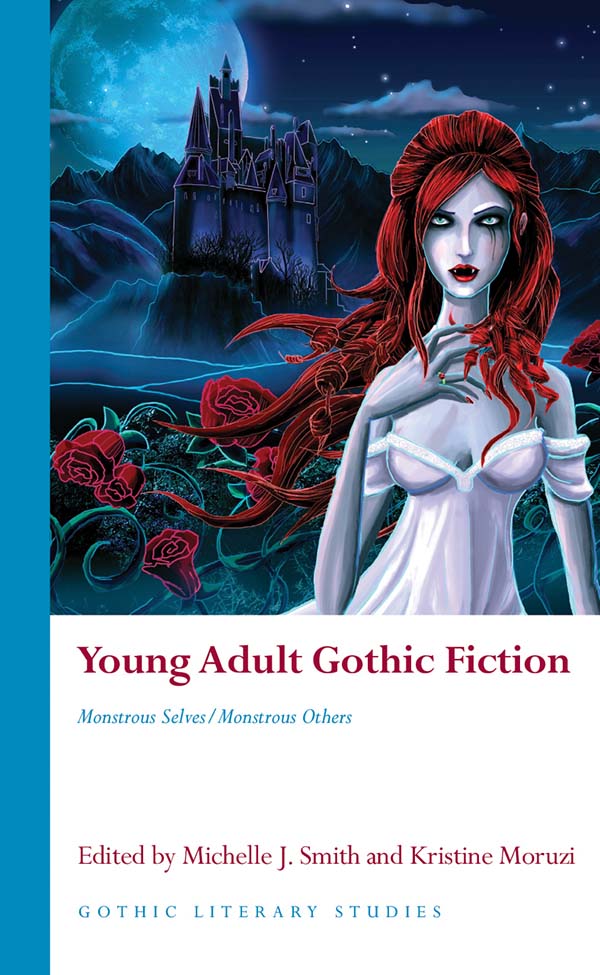Young Adult Gothic Fiction
Monstrous Selves/Monstrous Others
Golygydd(ion) Michelle J. Smith,Kristine Moruzi
Iaith: Saesneg
Dosbarthiad(au): Literary Criticism
Cyfres: Gothic Literary Studies
- Mehefin 2021 · 320 tudalen ·216x138mm
- · Clawr Caled - 9781786837509
- · eLyfr - pdf - 9781786837516
- · eLyfr - epub - 9781786837523
Am y llyfr
Y casgliad hwn yw’r cyntaf i ganolbwyntio’n llwyr ar ffuglen Gothig oedolion ifanc yr unfed ganrif ar hugain. Mae’r ysgrifau’n dangos sut mae’r don Gothig newydd gyfoes yn arwydd o bryderon ynghylch pobl ifanc (a gobeithion amdanynt) yn yr unfed ganrif ar hugain. Gellir cynnull cysyniadau newidiol am oedolion ifanc fel ffigurau trothwyol, yn gweithredu rhwng moddau plant ac oedolion, pan gânt eu cyfuno â mannau a chysyniadau Gothig mewn testunau i bobl ifanc. Mewn llenyddiaeth Gothig i oedolion ifanc, yn aml symbylir y croesi ffiniau sy’n nodweddiadol o’r Gothig gan blot rhamant heterorywiol, lle mae’r prif gymeriad benywaidd dynol neu anghenfilaidd yn chwennych bachgen nad yw’n cyd-fynd â’i ‘theip’ hi. Yn ogystal, wrth i’r Gothig weithio i ddiffinio’r hyn mae’n ei olygu i fod yn fod dynol – yn enwedig mewn perthynas â rhywedd, hil a hunaniaeth – mae’r gyfrol hefyd yn ystyried sut mae symudiadau a fflachbwyntiau cyfoes mewn gwleidyddiaeth hunaniaeth yn cael eu negodi dan glogyn trosiadol anghenfildod.
Dyfyniadau
‘This collection is a valuable contribution to discussions of Gothic fiction for young people. Its innovative, engaging essays address the intersections of the Gothic with genre, youth culture, spatiality, textual consumption, gender, and considerations of what it is to be human.’
-Professor Emerita Clare Bradford FAHA, Deakin University, Australia
‘This timely volume traces the ways in which myriad anxieties of being on the verge of adulthood in contemporary culture are given form in young adult Gothic texts. Paying particular attention to how the genre traverses boundaries, it reimagines the relations between power and oppression for teen characters and readers through the deployment of humour and horror, creative and corrective revisions of traditional tales, and alternate understandings of monstrosity, space, gender, and other-than-human beings.’
-Professor Karen Coats, Director of the Centre for Research in Children’s Literature, University of Cambridge
Cynnwys
Acknowledgements
Note on Contributors
1. Introduction: Kristine Moruzi and Michelle J. Smith
Section 1: Genre Trouble: Gothic Hybrids
2. Zombies Vs Unicorns: An Exploration of the Pleasures of the Gothic for Young Adults - Patricia Kennon
3. Genre Mutation and the Dialectic of YA Gothic Dystopia in Holly Black’s The Coldest Girl in Coldtown - Bill Hughes
Section 2: Rewriting the Historical Gothic
4. ‘Vanguard taste and fashion spirit’: Feminist Responses to Twenty-First Century, Western Zeitgeist in Vampire Romeo and Juliet texts - Sarah Olive
5. The Pre-Monstrous Mad Scientist and the Post-Nerd Smart Girl in Kenneth Oppel’s Frankenstein Series - Sean P. Connors and Lissette Lopez Szwydky
6. Rock Star Rochester and Heartthrob Heathcliff: The Problematic Redemption of the Byronic Hero in Recent Young Adult Retellings of Brontë Novels - Sara K. Day
Section 3: Gothic Places
7. Monstrous Islands: Spatiality and the Abjection of Motherhood in Gothic Young Adult Fiction - Cecilia Rogers
8. Adolescence Adrift: The Lost Child in Contemporary Australian Gothic YA Fiction - Adam Kealley
Section 4: The Human and the Non-Human
9. Accepting Monsters: The Visual Gothic in I Kill Giants and A Monster Calls - Debra Dudek
10. Unhuman Entanglement: Onto-Ethics and the Fiction of Frances Hardinge - Chloé Germaine Buckley
11. Black and White and Read All Over: Miss Peregrine’s Peculiar Children, Gothic Imagery and Posthuman Publishing - Jen Harrison
Section 5: Gothic Femininities
12. Testimony from Beyond the Grave: Comparing Girls’ Narratives of Sexual Violence and Death in Gothic Fiction - Lenise Prater
13. Young Adult Gothic Fairy Tales and Terrifying Romance - Michelle J. Smith and Kristine Moruzi


